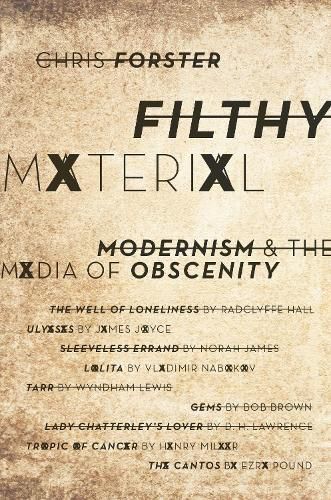Readings Newsletter
Become a Readings Member to make your shopping experience even easier.
Sign in or sign up for free!
You’re not far away from qualifying for FREE standard shipping within Australia
You’ve qualified for FREE standard shipping within Australia
The cart is loading…






Modernist literature is inextricable from the history of obscenity. The trials of figures like James Joyce, D. H. Lawrence, and Radclyffe Hall loom large in accounts twentieth century literature. Filthy Material: Modernism and The Media of Obscenity reveals the ways that debates about obscenity and literature were shaped by changes in the history of media. Judgments about obscenity, which hinged on understanding how texts were circulated and read, were often proxies for the changing place of literature in an age of new technological media. The emergence of film, photography, and new printing technologies shaped how literary value was understood, altering how obscenity was defined and which texts were considered obscene. Filthy Material rereads the history of obscenity in order to discover a history of technological media behind debates about moral corruption and sexual explicitness. The shift from the intense censorship of the early twentieth century to the effective ‘end of obscenity’ for literature at the middle of the century, it argues, is not simply a product of cultural liberalization but of a changing media ecology.Filthy Material brings together media theory and archival research to offer a fresh account of modernist obscenity and novel readings of works of modernist literature. It sheds new light on figures at the center of modernism’s obscenity trials (such as Joyce and Lawrence), demonstrates the relevance of the discourse obscenity to understanding figures not typically associated with obscenity debates (like T. S. Eliot and Wyndham Lewis), and introduces new figures to our account of modernism (like Norah James and Jack Kahane). It reveals how modernist obscenity reflected a contest over the literary in the face of new media technologies.
$9.00 standard shipping within Australia
FREE standard shipping within Australia for orders over $100.00
Express & International shipping calculated at checkout
Modernist literature is inextricable from the history of obscenity. The trials of figures like James Joyce, D. H. Lawrence, and Radclyffe Hall loom large in accounts twentieth century literature. Filthy Material: Modernism and The Media of Obscenity reveals the ways that debates about obscenity and literature were shaped by changes in the history of media. Judgments about obscenity, which hinged on understanding how texts were circulated and read, were often proxies for the changing place of literature in an age of new technological media. The emergence of film, photography, and new printing technologies shaped how literary value was understood, altering how obscenity was defined and which texts were considered obscene. Filthy Material rereads the history of obscenity in order to discover a history of technological media behind debates about moral corruption and sexual explicitness. The shift from the intense censorship of the early twentieth century to the effective ‘end of obscenity’ for literature at the middle of the century, it argues, is not simply a product of cultural liberalization but of a changing media ecology.Filthy Material brings together media theory and archival research to offer a fresh account of modernist obscenity and novel readings of works of modernist literature. It sheds new light on figures at the center of modernism’s obscenity trials (such as Joyce and Lawrence), demonstrates the relevance of the discourse obscenity to understanding figures not typically associated with obscenity debates (like T. S. Eliot and Wyndham Lewis), and introduces new figures to our account of modernism (like Norah James and Jack Kahane). It reveals how modernist obscenity reflected a contest over the literary in the face of new media technologies.